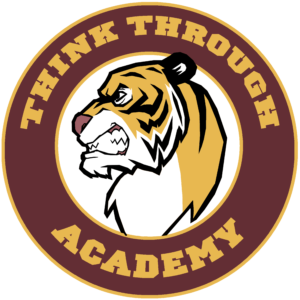COURSE OFFERING
COURSES
Think Through Academy’s core course offerings will be aligned with Arizona’s State Standards. As described above, students earn credit with 70% or higher. If a student is underperforming based on one or more school assessments, an intervention course will be required. Students who score at the “highly performing” level will be placed in honors classes. The following is a list of the courses that fulfill the state’s requirement for graduation.
English Language Arts:
English 1-2:
English 9 builds upon 8th-grade reading, writing, listening, speaking and critical thinking.
Thematic literature collections are related to personal experiences. Reading comprehension strategies and control of the six traits of writing are emphasized. Active listening and speaking are practiced in formal and informal situations. A variety of media presentations is evaluated for social and cultural messages.
English 3-4:
This course continues to refine skills developed in English 1-2. It offers a balanced focus on composition and texts that emphasize global themes. The six traits of writing are further refined in the context of the narrative and academic writing. Students are also introduced to MLA, and to support the school STEM focus, APA writing guidelines.
English 5-6:
This course continues to develop skills in the six traits of effective writing in the context of analytical and persuasive writing. Students will engage in self-evaluation and respond to audience feedback on their speaking and listening skills. Texts are selected to support the development of comprehension, discernment, and critical-thinking skills and will introduce more advanced literary techniques (irony, satire, humor, connotation, tone, rhythm, symbolism, etc.)The political and economic impact of media forms are examined.
English 7-8:
This course is designed for Seniors to demonstrate proficiency in all six traits of writing in all modes of composition. Texts are selected to provide a global perspective of humanity. Research findings are presented using MLA or APA in a research paper. Student continue to study the impact of Media forms.
Mathematics:
Algebra I:
This course provides students with the mathematical background necessary to meet college entrance requirements. Students will study fundamental algebraic concepts and reasoning. Concept units include: solving, graphing, writing, and modeling linear functions, the system of equations, exponents, radicals, polynomials, quadratics and statistics.
Geometry: Students will learn to recognize and work with geometric concepts in various contexts. They build on ideas of inductive and deductive reasoning, logic, concepts, and techniques of Euclidean plane and solid geometry. Students will use visualizations, spatial reasoning, and geometric modeling to solve problems.
Algebra II:
This course builds upon algebraic concepts covered in Algebra I. Students extend their knowledge and understanding by solving open-ended problems and thinking critically. Topics include functions and their graphs, quadratic functions, inverse functions, advanced polynomial functions, and conic sections.
Using the Graphic Calculator – Table of Contents:
TI-84+ Egg0 Series Interactive Game “Calculator Know How” Level: Beginning to Intermediate Users of TI-84+ family of graphing calculators. (Applicable to both “MathPrint” and “Classic” modes.) (Could also be played with other calculators.)
Science:
Earth Science 1-2:
This course introduces students to the study of the earth from a local and global perspective. Curriculum units explore topics that include: the study of the use of remote sensing, computer visualization, and computer modeling to enable earth scientists to understand earth as a complex and changing planet.
Biology 1-2:
This course provides students with a basic understanding of living things and provides students with a fundamental understanding of modern biology and scientific processes via hands-on-experiments and fundamental research.
Chemistry 1-2:
This course involves studying the composition, properties, and reactions of substances. Students will be expected to communicate their results of experiments via written lab reports.
Social Studies:
World History:
Students will study the development of civilizations around the world from the Renaissance to the present. Major themes will include the development and influence of human-geographic relationships, political and social structures, economic systems, major religions and belief systems, the effects of science and technology, the vital role of the arts, and the importance of trade and cultural exchange.
US History:
Students will study the nation’s history from the end of the Civil War to the present, including the emergence of the United States as an industrial nation. Arizona history will be emphasized.
US Government:
Students will study US government and civics, as well as Arizona state and local government.
Economics: Students will study the fundamental properties of economics, including business and consumers in the marketplace.
Electives:
Elective classes will include an Academic Advisory, Foreign Language courses, Math Lab, Reading Lab, and leadership courses, all of which are aligned to the school’s philosophy and program of instruction:
- Academic Advisory: This course is designed to support completion of graduation requirements and may include: regular academic monitoring, the design of High School and Beyond Plan, support with college applications, scholarship applications, administration of tests, and preparation for student-led conferences.
- Foreign Language Courses I: TTA students will choose a foreign language to study (Spanish, French, and/or Arabic). Students will study the foundational skills required for effective reading, writing, listening and speaking skills.
- Foreign Language Courses II: TTA students will build upon the skills learned in Foreign Language Course 1.
- Math Lab: (Algebra I Math Lab, Geometry Math Lab, or Algebra II Math Lab.) These are intervention courses that provide students with one-on-one support with more instruction time using a hands-on approach.
- Newcomer Mathematics: This course is designed to enable newly immigrated students to master the skills that are prerequisites for Introduction to Algebra. This course covers the skills typically taught in grades 1 through 8 in Arizona schools.
- Dropout Prevention Program: Students who are targeted as “risk of dropping out” will be placed in these courses. The leaders will partner with community agencies to provide some prevention program courses, job preparation, interview skills, communication skills, personal assessment and awareness activities, speaker presentations and small group seminars.






